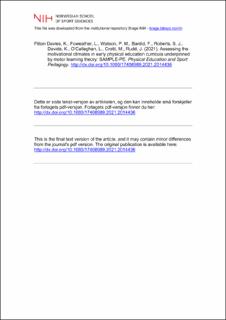| dc.contributor.author | Fitton Davies, Katie | |
| dc.contributor.author | Foweather, Lawrence | |
| dc.contributor.author | Watson, Paula M. | |
| dc.contributor.author | Bardid, Farid | |
| dc.contributor.author | Roberts, Simon J. | |
| dc.contributor.author | Davids, Keith | |
| dc.contributor.author | O’Callaghan, L. | |
| dc.contributor.author | Crotti, Matteo | |
| dc.contributor.author | Rudd, James | |
| dc.date.accessioned | 2023-06-23T11:51:44Z | |
| dc.date.available | 2023-06-23T11:51:44Z | |
| dc.date.created | 2022-01-26T17:06:19Z | |
| dc.date.issued | 2021 | |
| dc.identifier.citation | Physical Education and Sport Pedagogy. 2021. | en_US |
| dc.identifier.issn | 1740-8989 | |
| dc.identifier.uri | https://hdl.handle.net/11250/3072909 | |
| dc.description | I Brage finner du siste tekst-versjon av artikkelen, og den kan inneholde ubetydelige forskjeller fra forlagets pdf-versjon. Forlagets pdf-versjon finner du på tandfonline.com / In Brage you'll find the final text version of the article, and it may contain insignificant differences from the journal's pdf version. The original publication is available at tandfonline.com | en_US |
| dc.description.abstract | Background: Traditionally, Physical Education (PE) has adopted a multi-skills approach, where children generally engage in decontextualised practice of sport techniques to develop specific movement skills and facilitate sports participation. This approach has been critiqued for having a weak conceptual and philosophical justification, and a lack of empirical proof of its educational value. The SAMPLE-PE research project set out to challenge this by creating two PE curricula distinguished by contrasting theories of motor learning: information processing theory and ecological dynamics. While both approaches have shown promise in enhancing children’s movement skills, to date, there has been little consideration of their impact on the motivational climate of primary PE lessons. This study explored to what extent traditional PE, ecological dynamics, and information processing theory-based approaches create empowering and disempowering motivational climates when viewed through a self-determination and achievement goal theory lens. Method: Forty-four PE lessons were video recorded and coded by two trained researchers using the Multidimensional Motivational Climate Observation System. ANOVA, MANOVA and Bonferroni post-hoc tests were run to explore differences in data on motivational climate under the three different pedagogical approaches. Results: The group taught with concepts from ecological dynamics (referred to as Ecological) displayed a significantly lower disempowering motivational climate in comparison to the group taught with a basis in information processing theory (referred to as IPT) and the traditional PE groups. The ecological group revealed significantly more autonomy support than the traditional PE and the IPT group. The IPT group methods provided significantly more structure than traditional PE and the ecological group. Conclusion: The findings of this study have shown how the approach taken in delivering PE in primary schools may differentially affect motivational climates. Results imply that underpinning PE with theories of motor learning provides differing, viable and beneficial alternatives to create positive learning environments, compared to traditional PE practices. | en_US |
| dc.language.iso | eng | en_US |
| dc.subject | self-determination theory | en_US |
| dc.subject | achievement goal theory | en_US |
| dc.subject | motivation support | en_US |
| dc.subject | ecological dynamics | en_US |
| dc.subject | information processing | en_US |
| dc.title | Assessing the motivational climates in early physical education curricula underpinned by motor learning theory: SAMPLE-PE | en_US |
| dc.title.alternative | Assessing the motivational climates in early physical education curricula underpinned by motor learning theory: SAMPLE-PE | en_US |
| dc.type | Peer reviewed | en_US |
| dc.type | Journal article | en_US |
| dc.description.version | acceptedVersion | en_US |
| dc.source.pagenumber | 28 | en_US |
| dc.source.journal | Physical Education and Sport Pedagogy | en_US |
| dc.identifier.doi | 10.1080/17408989.2021.2014436 | |
| dc.identifier.cristin | 1990722 | |
| dc.description.localcode | Institutt for lærerutdanning og friluftslivsstudier / Department of Teacher Education and Outdoor Studies | en_US |
| cristin.ispublished | true | |
| cristin.fulltext | postprint | |
| cristin.qualitycode | 2 | |
